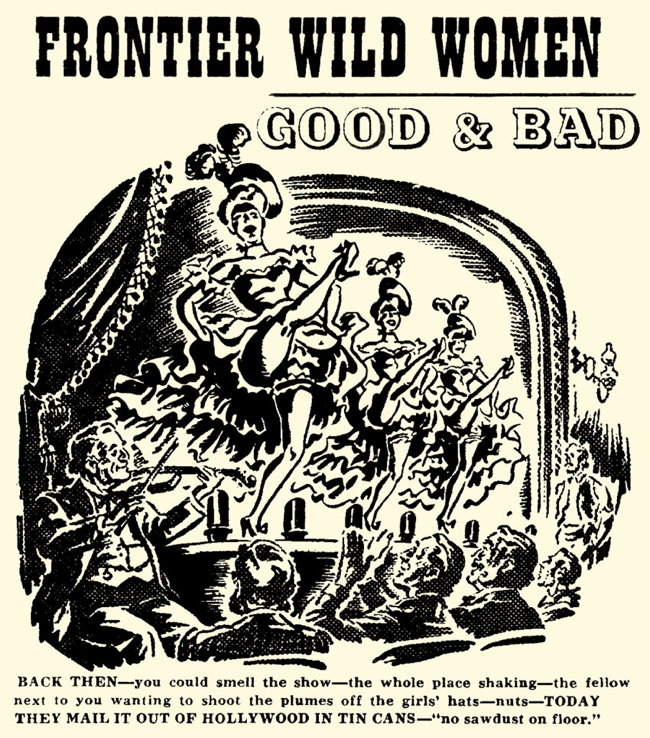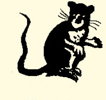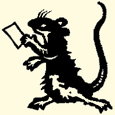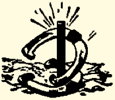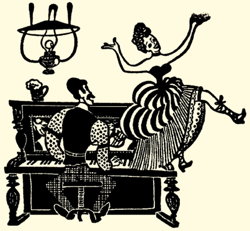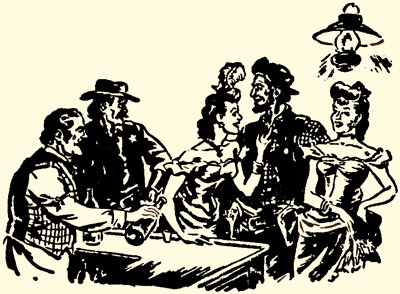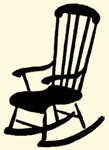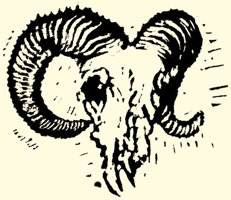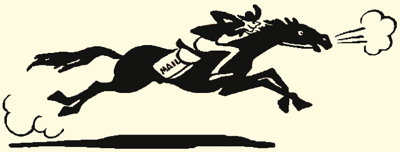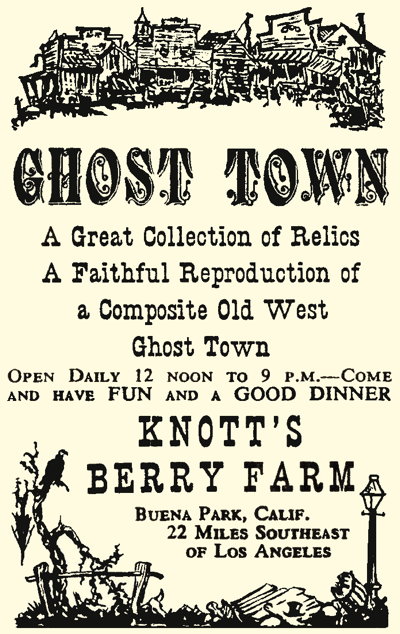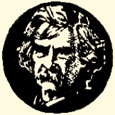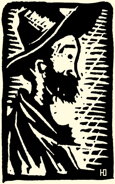BACK HOME COVER THIS IS HISTORICAL INFORMATION ONLY
PRICE 10 CENTS . . . . . . . ONLY ONE LOUSY THIN DIME
PACKET TWO OF POUCH FIVE
BORN 100 YEARS TO LATE: PACKET
PUBLISHED FOUR TIMES A YEAR
ONLY NEWSPAPER IN AMERICA YOU CAN OPEN IN THE WIND
DESERT RAT SCRAP BOOKPAGE 2
Smallest newspaper in the world and the only 5 page one.
Packet Two of Pouch Five
![]()
This paper is not entered as 2nd class mail. It's a first class newspaper.
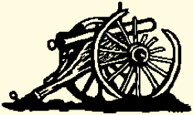
YOUR EDITOR SEES HOPE OF A POLITICAL FUTURE
Adlai Stevenson is the first candidate for the presidency since Lincoln with a genuine sense of humor.
The Governor best known as a humorist was George Peck of Wisconsin. (7 books of Pecks Bad Bly.)
![]()
|
THE MAIL |
V. Roberts, Johannesburg, Transvaal, S. Africa.
For humor is a gallant horse,
That gallops o'er the roughest course,
And takes the sting from pain.
It ends a quarrel with a laugh,
It cuts a trouble in half.
If shops sold humor they'd do so well,
They'd never have enough to sell.
Maybe that's why I get so many orders from South Africa.
CONGLOMERATES
When you are in doubt and perplexed—just do the task at hand with greater will and effort.—H. O.
In July and August my papers don't sell, but you should see my wood pile grow.
![]()
For in and out, above, about, below,
"Tis nothing but a magic shadow show.
—Omar Khayyan—a good old desert rat
![]()
Your publisher is tempted to change the size of this paper, but don't know if he should make it just the right size to fit those nice holders the "Readers Digest" has on all the news stands or cut it down to fit nicely into those snappy little "Quick" display stands.
![]()
Laugh and the world laughs with you.
Cry and it helps sell your paper.
![]()
You Desert Rats that don't read this paper are going to have a hard time looking wise around the camp fire, when my steady readers let go with their tall tales. They are loaded up with ammunition from Arizona, New Mexico, Nevada and California Deserts, (all right I'll add Texas for you) and Utah for me.
—Your Editor
![]()
People are funny; they spend money they don't have to buy things they don't need to impress folks they don't like.
![]()
Your Editor says: This democratic country of ours with it's give-away programs, with everything from unemployment compensation to mink coats has missed us old time gold hunters 'cause we ain't worked for nobody. Seems to us while they're still giving everything away they should stack up some baled-hay in the desert for us when we come back in reincarnation, as we will sure be Jackasses if we do come back.
![]()
WHY WORRY?
The professor fellows tell us that the recent Tehachapi earthquake had the power of 20,000 Atom Bombs—your editor in his "Magic of the Desert" — packet, told you, "The loudest noise in the world is thunder"—so what are you scared of?
![]()
NATION'S LARGEST COUNTY TOO LARGE FOR BLACKIE
Dry Camp Blackie sent the San Bernardino Chamber of Commerce a letter asking for a little map of San Bernardino County that he could carry in his wallet. In due time he received a letter from the Secretary of the C. of C. stating that there are no small maps of the great county of San Bernardino. Also the good Secretary, offered this, "I wish to help you and suggest you contact the local Five & Dime Store who have cut-out puzzles of the county that I think you might carry parts of, in each of your pockets.
This is a Mark Twain tale we haven't come across before—when Mrk was at the height of his career he informed a friend: "It took me 10 years to discover that I had no talent for writing."
"And you gave it up?"
"Oh, no! By that time I was too famous!"
![]()
Notice in Desert Hot Springs newspaper — "60 acres for sale, between Garnet and Whitewater, if purchased before the next heavy windstorm a three room shack will be included."
![]()
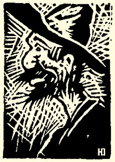
Desert Rat Jake Topper, sez: The trouble with chewing tobacco is that you've got to keep your mouth shut lots of times under exasperatin' circumstances.
![]()
When his doctor advised a change of climate, the eastern city-dweller went looking for a healthy6 place to live in the Southwest. In one small Arizona town he approached an old-timer sitting on the steps of the general store.
"Say," he asked, "what's the death rate around here?"
"Same as it is back East, bub," came the answer; "one to a person."
![]()
Old Desert Steve Ragsdale warns me that my getting out this newspaper won't be so much fun once I learn to read and write.
![]()
Jerome Arizona—the jail here took a slide. Slipped down the hill about two blocks.
The good citizens were quick to post signs KEEP OUT.
![]()
 My Dog Whiskers
My Dog Whiskers
The best dog I ever worked for
There is a dent in the front fender of my 1928 Ford Station Wagon (first in 24 years). "Whiskers" my dog is to blame, he went to sleep at an intersection and didn't tell me what to do.
•
When Blackie and I do a little drinking "Whiskers" my dog is a "Scolding Mother" — but when we get together and don't drink we think of him as the "Old Professor." (Blackie says my dog is my conscience.)
![]()
Ol' Rip Snortin—lost three fingers yesterday. A feller asked him to have a drink—but his wife was with him.
PACKET 2, POUCH 5 THE LADY WILD CATS OF THE OLD WEST PAGE 3
BORN 100 YEARS TOO LATE
You are the reader, you pay 50c a year to read this stuff, I have to get it together, make the pictures, print it, wrap it, mail it, etc. Why should it all be what you want? This page is about the Lady Wild Cats of the Old West. Just for me. Your editor is an anti-feminist with a weakness for women. I like this page, maybe you will too, I make the yarns short.
Your Editor likes to say it in a few words—I don't use up all my kindlin' to get the fire started.
![]()
Your Old Desert Editor thinks, this day and age, there is nothing as pretty as a Western Gal with long slender fingers a'rolling a Bull Durham Cigarette.
![]()
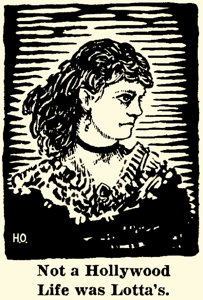
Grass Valley's Lotta Crabtree,
Ingenue of the Roaring 50's
A pupil of Lola Montez in the early 1850s, whom she taught to sing and dance in her mansion at Grass Valley. At 8 years of age Lotta made her first public appearance at Rabbit Creek (now La Porte) in Plumas County. When gold coins, and gold dust pokes fell into her mother's, Mary Ann Crabtree's apron, her husband—"shiftless Pa," refused to work any longer in the mines. His wife, with daughter Lotta, left him and in a buckboard toured the mining regions, and larger cities of Sacramento and San Francisco, swelling her pocket book with the ingenue's income. Each time a courting suitor took interest in Lotta, her mother ushered her on to the next town, breaking up many matches, with the result that pretty Lotta died an old maid, worth, it is claimed nearly 3 million dollars.
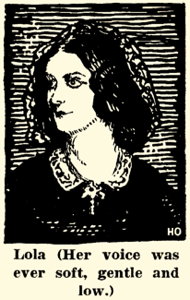 Lola Montez of the Roaring Fifties
Lola Montez of the Roaring Fifties
Countess of Landsfield in California
She fled the revolution of 1848, as the Countess of Landsfield, a title bestowed on her by Ludwig, King of Bavaria, in whose court she waved too much influence for the safety of the country as well as her own. In 1851 she came to America, and on to California, via Panama, in 1852, in pursuit of her real love, a former student of the University of Paris. In the early Spring of 1853, finding her loved one already married, she proceded to marry Patrick Hull, whom she divorced soon after. Her life at Grass Valley is both history and legend in the early annals of California. As belle of the Roaring Fifties perhaps no other commanded more attention, as well as notoriety, than the asure-eyed, raven haired beauty, who was queen of the spider dance, teaching Lotta Crabtree, next door neighbor, how to sing and dance, and become a winsome actress.
North Star in the Desert
In the year 1909 your Editor came west, (then 22 years old) looking for Wild Women of the West. At Seattle on the pike of the Great Worlds Fair, I found her, she was a beauty, it took me all summer to get to meet her, she was a Queen of the fun zone, a bright-eyed, cherry-cheeked, beautiful Eskimo girl dressed in native furs, night after night I went to the show just to see my North Star—then one night the lights went out—the fans stopped—a lantern was brought in and we were told to stay where we were till the lights came on. In the near darkness I worked myself over near the stage and for the first time I heard her speak—as she fanned air down the opening in the fur at her throat — "Mucho dam Caliente" she said. Yes, she was a Mexican Señorita from San Bernardino, and is on my mailing list today. I tell her she saved me a trip to Alaska and helped me to find the Desert.
![]()
HEARD AT A BAR IN RENO
"Woman is nothing but a rag, a bone and a hank of hair."
"Man is nothing but a brag, a groan and a tank of air."
![]()
A desert pioneer woman, the soles of whose feet had been toughened by a lifetime of shoelessness on the burning sands, was standing in front of her cabin fireplace one day when her old man, said, "You'd better move your foot a mite, Maw, you're standin' on a live coal."
Said she, nonchalantly: "Which foot, Paw?"
![]()
FRESNO'S ONE-SHOT ANNIE HITS THE BULLS-EYE
Most successful business men are working their heads off doing things they don't like, in places they hate, trying to save money they can't keep, in order to spend a few years when they are too old to enjoy them in some picturesque Desert spot.
![]()
The names of most dance-hall girls have been forgotten. One exception is Anna King, who was murdered in a dance-hall brawl at Bonanza and was buried by a committee of miners from Custer who learned that respectable townsfolk did not want her bones to lie in the town graveyard. They planted her well to one side in a square of earth marked by four pine trees. So magnificent were these trees that Anna's grave became eventually a state beauty spot cared for by the Department of Forestry.
![]()
My friend Lee Lindley, says, It's got to be "Hoakum" to "Hook 'em."—so here' go's.
![]()
Life has a way of evening up things. For every woman who makes a fool out of some man there's another who makes a man out of some fool.
![]()
In the Old West it wa said, "No Gentleman would hit a woman with his hat on."
![]()
She was a woman of few words, but often.
![]()
A woman—speaking at a National convention is like a dog walking on his hind legs. It is not done well; but you are supposed to find it done at all.
![]()
You have heard of the old woman of Yuma who said she always felt bad even when she felt good, for fear she would feel worse tomorrow.
![]()
"An Eskimo woman is old at forty," says an explorer. An American woman is not old at forty. In fact, she's not even forty.
![]()
She stepped off te stage at Nevada City in 1854, dark-eyed, fresh-faced girl of twenty, dressed in the height of fashion. Opened her own gambling establishment, dealing (twenty one) became an immediate success, paid off her bets with a friendly smile, but kept peace and order in her place, her virtue was unquestioned. She is said to have broken up many a pistol-flourishing mob by joking and laughing with the men.
![]()
A review, a page from
WESTWARD THE WOMEN
By Nancy Wilson Ross
Published by Alfred A. Knopf, N. Y.
Anther famous Idaho character whose respectable married name is best left unmentioned is said to have been a sister of Calamity Jane. This statement is sworn to by the ballad-singing, half-blind hermit who lives near the Golden Anchor mine alone with his memories, which include such garish items as a harem of seven Sioux squaws. This old man bases his ascertion on his remembrance of the night he saw Calamity Jane's brother going down to a dance hall — whether in Deadwood Gulch, Blackfoot, or Virginia City he did not say—to shoot his younger sister because she was "turnin' out bad." Apparently the younger sister decided to leave home hastily, for she survived, and she did not reform. The records say that Calamity Jane — who could outlie, outshoot, outswear, and outdrink any ten men of her era, and who boasted of campaigning against the Arizona Apaches, scouting for Sioux on the Rosebud and swimming the Platte River with dispatches for Custer, thus avoiding the massacre of the Little Big Horn—did have a sister. She had, as a matter of record, two, but data on them is scarce, ranging from virtuous deaths from tuberculosis brought on by leaning over steaming laundry tubs, to apprenticeship to Mother Mustache, to the queen of the underworld gamblers of six states. The latter activity seems a more likely career for a sister of the Far West's most untrammeled female. This sister, if such she was, had another name before her Idaho one. It was, says the hermit of the Golden Anchor, Lousy Liz.
![]()
What did the little porcupine say when he backed into a cactus?
"Is that you mamma?"
![]()
Yesterday he cleaned his shot gun on the front porch and today his daughter got 8 proposals.—The Earthworm.
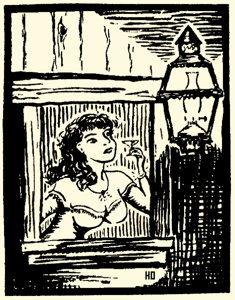 STREET OF RED LIGHTS
STREET OF RED LIGHTS
in old Virginia City
The Story of Julia Bulette
As in all frontier towns Virginia City's "Sporting row" was for many years a feature of the city's night life. Here the "Calico Queens" and "Gold Tooth Tessies" discretely showed a red light to attract the well-heeled miners and prospectors out to have their fling. Here they meet Molly b' Damn, Peg-Leg Annie, the Cornish Queen, Little Gold Dollar, and the Irish Queen, but first and most celebrated of the courtesans of the Comstock was Julia Bulette — murdered for her jewels in the Lode's early years. The Hanging of her murderer provided one of Nevada's most gala holidays. The popular Julia was one of the leading citizens of the Comstock, despite the house of ill repute she operated. Witty, charitable, and respected by the male population.
FRONTIER LADY CLEANS UP CAMP
People didn't mince words in the good old days. When a nameless woman came to a gold-strike with nineteen men, and during an argument with one of them she shot him dead with his own pistol, it was taken calmly. She simply stepped to the door of the tent and announced quietly: "I've shot Hardhat!" That's all there was to it. Good riddance, anyway. Hardhat, in all likelihood, would be missed by no one, not even his mother. A committee was set up to act as coroner. In the committee's report it was regretted that it had been left to a lady to clean up the camp.
![]()
THERE AIN'T MANY TEARS SHED AT A BOOTHILL BURYIN'
Here at Old Fort Oliver I have a weathered, wooden, boothill, graveyard relic—
came from old Calico—I was told.
NIGHTSHIFT MURPHY
Died Friday 13, April 1888
Under this slab lies Murphy
We buried him today
He lived the life of Riley
While Riley was away
![]()
The Ohlers of El Nido del Los Chivos—
Want to know if when a Squaw has twins are they Papooses or Papeeses?
![]()
When the well is dry they know the worth of water.
![]()
The Russians can't claim this one. The rocking chair is an original American invention dating back to about 1765.
•
It's for sure, Russia won't claim they were the inventors of MacArthur's corn-cob pipe.
![]()
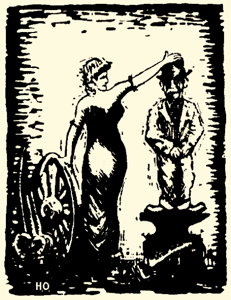 SHORTY HARRIS and the PRIMADONNA
SHORTY HARRIS and the PRIMADONNA
Why Shorty Slepet With His Hat On
In Death Valley where the sun beats down most every day in the year, there's a little monument — a plaque which reads,
"Here lies Shorty Harris,
a single blanket Jackass prospector."
![]()
All old time prospectors spin yarns about this little, unassuming character who came West after the Civil War in search of gold.
I gathered this yarn from a sweet old lady in Hollywood who years ago visited Ballarat in its heyday, (I had heard the story of Shorty's love affair with a Lady Blacksmith who was well over six feet tall) so I asked this lady if she had stayed in Ballarat—"No not but a day or so, I will always remember those days in that old stagecoach, coming and going—I will remember Shorty too, he was a little doll, I saw him in the blacksmith's shop"
As she got out of her chair I realized she too was tall, "At first I thought him a boy," she said. "He was quick to tell me of the miles he had walked, the mines he had discovered, yes, and of his many romance's too. He was so nice. He gave me a nugget. He did not mind when I picked him up and put him on the anvil—and told him to keep his hat on.
PAGE 4 WILD WOMEN PACKET
This page is dedicated to the World's Greatest Optimist--the Desert Prospector
Harry Oliver's
DESERT RAT Scrap Book
Charles Russell

WHY WESTERN TALES ARE TALL
Charles M. Russell
Western Painter and Story-Teller
A man in the States might have been a liar in a small way, but when he comes West he soon takes lessons from the prairies, the desert, where ranges a hundred miles away seem within touchin' distance, streams run uphill, and Nature appears to lie some herself.
![]()
THE FROZEN FLAME
of
MT. SAN JACINTO
Old San Jacinto Mountain can be seen from almost any point in Southern California. Your Editor's favorite spot to view San Jacinto's awesome heights is from Snow Creek Bar in San Gorgonio Pass. Here Bert or John Secor will hand you highpower glasses and tell you, you are face to face with the highest rock wall in the nation, that no wall in the Grand Canyon is much more than half as high.
Old timers gather at Snow Creek Bar and tell tales about the startling change of temperature you are beholding, from desert cactus up and above timber-line. Some of which are pretty tall tales even for this paper. Here is one of Bert's yarns and as I am in it I must say it's a true story.
![]()
Harry Oliver and I wanted to find a short cut over the mountain to Idyllwild, instead of going round by way of Banning, so we fitted out with a few days' supplies, and started up the snow-filled canyon. We had on Reverse Toboggans, which enabled us to travel up hill as easy as going down hill.
After two days of climbing we wer on top of the 10,800 ft. peak, and a terrific gale was blowing. "No one can live here" I said to Harry, bending against the gale. "But some one does live here" he replied, pointing to a group around a fire. We approached cautiously and found the 3 frozen stiff, and even the flame was frozen to a dull red hue.
"I've got to have a drink" said Harry, as he took out one of the quarts, "but I need some ice cubes for my shot." So we made another fire, making sure we did not thaw out the frozen Indians. We boiled some water, and as we started pouring it into the molds the temperature took a sudden drop and those cubes froze so quickly that Harry scalded his fingers taking them out.
We started down the other side shortly, Harry in the lead, but he went so fast that friction of his skin on the snow caused the flames to shoot out. I lost sight of him, but I could follow his trail by the scorched snow, and when I came upon him his dog "Whiskers" was licking the frostbite out of his burned feet.
Truly, Mother Nature tells a tall tale at this spot, for if you stop your car and look up at that snow, say on the 4th of July, you will not wonder that the old timers tell 'em too. (And only 10 miles from Palm Springs.)
![]()
Robert Hannum is 6 foot 4 so I will not call him a damn liar. Bob is a nationally known ornithologist and has been making a motion picture of the home life of a family of eagles, "From Egg to National Emblem," I think he is calling it. With telephoto lens, from tree tops, from many rock ledges, Bob had his story up to the point where the young birds were about to take off.
Then the big day came, spending hours Bob climbed the almost shear mountain side, camera on belt, rope in hand, when a few feet below the nest he gave his rope a fling, tested it with a pull—he had it safely around a rock—hand over hand Bob climbed to the ledge with the nest, then those 4 eagles sure came at him. Desperately hanging to the rope he started to get out, while he still had his eyes—then, and I know it's true (Bob is 6 foot 4 and he told me). Yes sir, at just the right time to save him, Bob was pulled out of that mess, and got a good picture as he went up.
You see when Bob tossed that rope, he had thrown it over the horns of a big buck Big Horn Sheep.
![]()
One: What do you mean kicking my dog? He don't even bite.
Other: Yes, but he raised his leg and I thought he was going to kick me
THE WAGES OF SIN
by
John Herr
![]() It was up in Goldfield, Nevada, just after the big strike was made and the boom was going full blast. Saloons and gambling houses never closed their doors and prospects with good showings were selling for cash at fancy prices. Old Jack Bailey and his partner drifted into the camp from California, staked a claim about a mile out of town and started a shaft.
It was up in Goldfield, Nevada, just after the big strike was made and the boom was going full blast. Saloons and gambling houses never closed their doors and prospects with good showings were selling for cash at fancy prices. Old Jack Bailey and his partner drifted into the camp from California, staked a claim about a mile out of town and started a shaft.
When they got down about fifty feet they built a high fence around the shaft and dump and would allow none around the place. Several times they showed very highgrade gold ore to a bartender in town, swearing him to secrecy.
At sixty feet they struck water in the shaft and it filled up to within twenty feet of the top which was just what they had been praying for. Then they got out their sack of highrade which they had brought from California and scattered it over the top of the dump and went to town. That night the gamblers got them drunk and they stayed drunk for several days. During this time the gambleres found the rich ore on the dump and assumed that the water had run the miners out.
Old Jack and his partner were finally persuaded to accept a measly $25,000.00. They hurried out of camp fearing the wrath of the salted gamblers. The new owners pumped the water out of the shaft and in the bottom was four feet of highgrade ore which Old Jack's last round of shots had broken into and also broke into the water.
The gamblers could never understand why the rich ore in the bottom was so entirely different from the rich ore on the dump. Within three months they sold the property for a million dollars. They never knew they had been salted and as Old Jack and his partner didn't stop until they reached Mexico, they never learned what that last round of shots opened up besides a lot of water
Five years later one of the gamblers now being a respectable millionaire was spending the winter in Mexico City and old Jack, now broke, was there trying to promote a grub stake. As the gambler was entering a hotel through a revolving door, Old Jack happened to be leaving the hotel through the same revolving door. At a glance, each recognized the other and expected to be filed full of lead.
The gambler rushed into the hotel and locked himself in his room. And Old Jack rushed down the street and hid in an alley.
JOHN HERR.
![]()
People forget how fast you did a job, but they remember how well you did it.
![]()
20,000 BEARS REPORTED IN CALIFORNIA
How many kinds of bears are there in California?
Chances are you'd number off at least four species, and even throw in the Himalayan for good measure
The right answer, according to the Department of Fish and Game's answer man, is just one. Facts are as follows:
There is only one species of bear in the state—the California black bear.
There are about 20,00 bears in California, give or take a cub or two.
They live generally above the 2000 foot level in the Sierra, the Sisikyous and Coast Range with the largest concentration in Northwestern California around Mendocino and Humboldt Counties.
Given a chance to make up his own mind, old brer bear is a peaceful critter who won't bite you unless you bite him first.
And he ain't fit to eat anyway.
—Thanks to Chas. Lockwood
![]()
Why do people say it's a man's world, when statistics prove women live longer than men—especially widows.
![]()
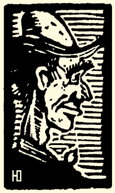
Plug Stewart says, when he listens to the radio these days he can't help wondering how the early settlers ever existed without the hundreds of kinds of soap that RADIO IS MADE OF. Says, "Just think of us kids smoking corn-silk out back of the barn, and not (according to radio), ALL THE DOCTORS, WOULD RECOMMEND ALL the kinds of CIGARETTES."
![]()
The childhood shows the man, as morning shows the day.
Only One World Famous
VALERIE JEAN
DATE SHOP
11 Miles South of Indio on Highway 99
or Please Mail Your Order
1-lb. Finest Dates and Confections, $1.30
3-lbs. Finest Dates and Confections, $3.50
Including Delivery — write for Folder
VALERIE JEAN DATE SHOP
Thermal, Calif.
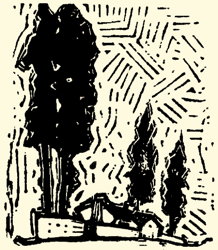 THIS IS CALIFORNIA
THIS IS CALIFORNIA
The Last Slice of La Ballona Rancho.
First printed in Rob Wagner's SCRIPT
January 2, 1937—Beverly Hills
 Editor's note—It gives me a great deal of pleasure to reprint this (somewhat personal) story of our old family Rancho.
Editor's note—It gives me a great deal of pleasure to reprint this (somewhat personal) story of our old family Rancho.
A pair of showmen of extraordinary ability have selected this simple story (as they say) for "THE PERFECT CALIFORNIA MUSICAL." Their brief letter states—their reason is that it is truly a California Story without — Prune-pickers, Oil, Oranges, Real Estate, Motion Pictures, Cafeterias, Aeroplanes, or Tourists.
However they do say it's modern (though undated), has the background and the color of "California's Mañana Days," Adobe Walled Gardens, A bit of mystery, Old Wine, Sparkling Spanish Beauties, Whistling Frijoles, and not too much story, but one that suggests a dozen songs.
As we stretched our legs to the welcome fire, I handed my neighbor a tall glass of tequila punch, reddened with the juice of a blood orange.
Outside, we had prowled around in a typical La Ballona Valley fog (Culver City fog, they call it now), as I showed him each stake marking the line of the new highway to Ocean Park, and explained how much of a slice it would take from my old adobe home and its garden.
"Your drink is good, but you're a fool, and I'll tell you why. Too much sentiment. Just because your people came out here in the early days and changed their names to Spanish, you buy old books on California, old maps; you plant gardens like a mission padre, and gather old pots and junk. Why you have hung on to these old ruins of yours is more than I can understand. The day you discovered that natural map, outlining California, in the cracked wall over your fireplace, you told me the cracks dated from the earthquake of 1885. I suppose you will tear that wall down; then put it up again, before they put the lower road through."
I answered that he was right; I was starting in the morning with old Mortez to handle the 'dobe work.
"Mortez, the old fellow who helped you the other time? He belongs to the family that was here before somebody did something or other—don't remember what—let's see—yes, I do! He was the one who told you about how your Uncle Enrigo died—by jumping out of a window and running the spoke of a century plant through his middle.
 Maybe so. They do say strange things happened around here in the early days. I remember the months you were off your feed—mooning and moaning about that tall, dark one—her beautiful tortoise-shell earrings all carved with doves, bill to bill. I'm going home before I remember more."
Maybe so. They do say strange things happened around here in the early days. I remember the months you were off your feed—mooning and moaning about that tall, dark one—her beautiful tortoise-shell earrings all carved with doves, bill to bill. I'm going home before I remember more."
As he walked through the garden I could hear him saying, "The moon — the sea — guitars, on horseback — the song starts with the horses—bah!"
The next day, Mortez and two Mexican boys went to work taking down walls, uncovering adobe secrets of another decade. The bricks revealed sun-baked footprints of quail, coyote and children that were as sharp as if they had been made yesterday. I wondered if tiny imprinted toes of a baby of three—maybe four years—were those of old Mortez, now four-and-seventy.
Just then the neighbor shouted, "Hi, you, it's mud! Just mud, dry for a hundred years."
I showed him the imprint of the foot.
"Looks like a girl's, with that high arch. You think it might have been hers? How old is this wall? Better date the new bricks, so some old fogy a century from now and make better guesses. With this parting thrust, he dropped out of sight.
That night was to be the last in my room till the new wall went up. After I had been asleep some time, a strange noise overhead and the dropping of a few crumbles of plaster startled me. Again I fell asleep—this time to be awakened by a large piece of plaster falling on the pillow beside my head. I jumped out of bed. Peering through an opening in the wall, I could see two hands working away to loosen the adobe.
Why should anyone do that? I slipped on a pair of sandals, very quietly went out into the hall taking with me an old sixshooter—slipped through the back door then, stepping over vines that lay on the grass, circled the house.
Just as I looked around the corner, a car came down Hughes Avenue. For an instant its lights penetrated the fog, revealed a stooped figure picking away at the wall.
I tripped on a vine. The figure bending over his task heard me. Grabbing a small pick, he made two or three quick jabs, took an object from the center of the adobe, and started to run to the point of our wall. I fired once, twice; then suddenly found it was my old Mexican. What had he picked out of the niche? I fired two more shots. He dropped something and disappeared around the wall. I knelt down and picked up a tin box. The next instant a shadow crossed the path. Realizing Mortez had come back to get the loot, I stepped quickly toward him and said, "Come on, you old pirate, let's go in and open this." With that we started for the house.
The box, about ten inches square and three inches deep, was sealed with rust. I told Mortez that, together, we could see what was in it. As he knew a lot about my Uncle Enrigo Olivera—his father had worked for Uncle—I asked why he was so interested.
"Seventy years ago," said Mortez, "Ricardo Urives, the desperado, after cleaning out the Calle de Los Negros, lived for days at the Rancho La Ballona."
Thinking of the fifty-dollar octagonal gold slugs in common use in those days, I grabbed a can-opener and tore off the lid. There came into a view an old tintype of a beautiful woman in Spanish dancing costume. I was startled because of her resemblance to one I had known in this generation. The picture was in a frame, decorated with what once had been bright-colored yarns. Tied to it by a faded ribbon, was a large tortoise-shell comb with doves, bill to bill. I was happy for Uncle. I showed no emotion and neither did Mortez, for he knew I knew. Then a book and more papers.
It was a dusty, mildewed book, Uncle's diary, and as I opened the first page, I could read in rust-colored ink: "1851," and across the face of the front page, in bold red paint: "Within this book I give you a fortune."
The old Mexican was so interested that it was hard to get him to go. Only after I made it plain that I wanted to investigate the book alone, did he finally leave—showing no embarrassment over his attempt to rob me.
The hours that followed I shall never forget, for in his diary Uncle bared himself of everything. The first pages covered briefly his journey from Boston to Chili, and from there on to Frisco.
The diary proper started with his successful winnings in 1852, after putting everything he owned on José Andrés Sepulveda's Black Swan, the horse which won over Pio Pico's Sarco.
There were many references to Crooked-nose Smith, Cherokee Bob, and other desperate characters who walked the streets at that time.
Late in the year '52, Uncle gathered a small band of mission Indians and put them to work making 'dobe bricks on the Rancho La Ballona. He evidently dreamed of the great things he could do with the ranch Early in '53 he left Olvera Street to start actual planting.
There was his little account of how Las Palmas got its name—two tiny sprouts brought from the base of the palms in the little square at the San Diego Mission. These sprouts, planted by uncle Enrigo, were the start of the town of Palms, now Palms Station, Los Angeles.
It was daylight when I finished. Although I had gone all through the book, it wasn't till noon the next day that it occurred to me that a fortune was promised to the possessor of this book.
The end wall had now been taken off my room and the foundation for the new one laid.
Try as I might, I could not stay awake that night to go once more through the diary. I read a chapter on Joaquin Murietta's theft of the horses on Jim Thompson's Brea Rancho, and their return fro Tejon by the old chief Zapatero. But it was no use. Taking the book, and closely scrutinizing the picture of the Spanish dancer and the comb, I put it away carefully in the top of the desk. She wore the same earrings which I had once possessed. It brought back a vision of that never-to-be-forgotten day when I opened the old gate to the east garden, my first visit here—her unexpected welcome—her loveliness.
At noon, I went with my neighbor to a restaurant where I read to him some of the most interesting parts of Uncle's diary. Impatiently taking it away from me, he remarked, "You are looking for romance, not fortune. Let me have a look.""
Soon he tapped me on the shoulder. "Say, here it is!" And he read: "I am convinced there is a fortune awaiting the first in California to go into bean culture for export. Some day we will have a harbor, and there is no reason why we should not supply the world with beans. I have experimented on my two sections, lying in the valley along La Ballona Creek, and have discovered that in this part of California there is no such thing as bean mildew."
Today my thoughts went back to what was on those two sections. How Culver had taken the bean fields and chopped them into little squares which are dotted with homes (Culver City). Uncle hadn't figured on this. Not much chance for me to raise beans.
My friend laughed and called the waiter: "Two orders of chili beans. That's it, we will drown our sorrows in chili beans — well, that's great; that's funny. Your opportunity is here, Jack-and-the-Beanstalk, a fortune in beans and less than an acre to do it with."
I laughed with him, but I was sorely disappointed I had hoped for the fortune and surely needed it. An Irish waiter had just brought in the last of our Spanish food, and beyond the door I could see the colored woman who was doing the cooking. She was pouring a kettle of steaming beans into a colander. I unconsciously began to name the many varieties I knew: "Mexican jumping beans, horse beans, black-eye beans."
With a slap on the back of the neighbor roared, "Chili beans, lost beans, spilled beans! Boy, you're a bean king! 'Cafe del Frijole Perdido!' Savvy' Cafe of the Lost Bean!"
 I like to stand looking over the wall with my neighbor, but it is probably better to let you know how you will be greeted if you should stop on your way to the beach, at the 'Cafe del Frijole Perdido.' As you pull up to the curb, your are met by Mortez, mounted on a beautiful pinto horse, a wide-brimmed sombrero pulled over his shiny brown face, and a smile that is emphasized by a long, white moustache. With his greeting will come the assurance that your car will be looked after. Upon entering the gates, you find throngs of people seated at little iron tables scattered about the lawn. You hear soft strains of music from stringed instruments somewhere in the garden.
I like to stand looking over the wall with my neighbor, but it is probably better to let you know how you will be greeted if you should stop on your way to the beach, at the 'Cafe del Frijole Perdido.' As you pull up to the curb, your are met by Mortez, mounted on a beautiful pinto horse, a wide-brimmed sombrero pulled over his shiny brown face, and a smile that is emphasized by a long, white moustache. With his greeting will come the assurance that your car will be looked after. Upon entering the gates, you find throngs of people seated at little iron tables scattered about the lawn. You hear soft strains of music from stringed instruments somewhere in the garden.
If you enter the main dining room you see Rosita, closely resembling the lady of the tintype, wearing a tortoise-shell comb with two doves, bills together, a shawl of bright yellow, and earrings.
As you get quick glances from her deep black eyes, you wish you were young and handsome. There are always young men at her elbow, and among them you will find Bob, my nephew, who has a half-interest in a desert gold mine and wears a well-cut suit. You will ask the name of the bean salad of some smiling waiter who once helped Mortez build 'dobe walls.
Rosita smiles as Bob puts another log on the fire, poking it with the old La Ballona Rancho branding iron.
And if on some moonlight night you should stand in the shadow of the fragrant night-blooming Angel's Trumpet near the old gate where Bob parks his car, you would see him take a guitar from the rumble seat. Rosita tunes it before settling in the front seat, for the song must start with the horses — I mean the car — for this is California.
•
With foresight these young showmen see loser relations with Old and New Spain, "BASED ON AIR-BASES."
SAID OF MY NEW BOOK
|
THE DESERT MAGAZINE SAYS: Fed up with the make-believe of Hollywood where he had survived as an art director for many years, Harry Oliver moved out to a homestead in Borrego Valley in 1916—and there he wrote and published Desert Rough Cuts—a Haywire History of the Borrego Desert.
|
THE CALICO PRINT SAYS: THE OLD MIRAGE SALESMAN, A Whimsical Desert Digest of Refreshing Nonsense, Heralding the life of the Southwest's foremost story-telling Desert Rat, Harry Oliver Compiled by his daughters, Amy and Mary, Printed in Palm Springs by the Printery, 1952, Many Harry Oliver woodcut illustrations. 111 pp. $3.00
|
Mark Twain, whenever feats of heroism or ingenuity were being bragged about, would come forth with a little story of his own which usually climaxed the discussion.
"There was a fire in Virginia City one night, and old man Hankinson got caught in the fourth story of the burning house. It looked as if he was a goner. None of the ladders was long enough to reach him. The crowd stared at one another, nobody could think of anything to do."
"Then, all of a sudden, boys, an idea occurred to me. 'Fetch a rope', I yelled, 'somebody fetch a rope', and, with great presence of mind, I flung the end of it up to the old man Hankinson. 'Tie it around your waist,' I yelled. The old man did so, and I pulled him down."
$100 SERMON
"That was a damn good sermon," said a man to the minister at the conclusion of the service.
"Watch you language, sir," admonished the minister.
"That really was a damn good sermon. In fact, it was so good I put $100 in the collection plate."
"The hell you did!" exclaimed the minister.
—The Liquid Line
![]()
Old Mining Days in
RANDSBURG
For many years a mining company in the Rand District employed a Chinese cook, and one evening after an unusually good dinner the superintendent decided to raise his wages. The next pay day the Chinaman noted the extra money in his envelope.
"Why you pay me more?" he asked the superintendent.
"Because you have been such a good cook all these years" replied his boss.
The Chinaman thought it over, then said, "You been cheating me long time, eh?"
—Thanks to Bill King of Beaumont
![]()
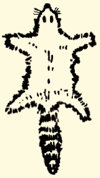 You Can't Skin A Coon 'Til You Shoot It--
You Can't Skin A Coon 'Til You Shoot It--
Coon-Skin Conky, the "Emperor Norton" of Palm Springs, says, the coons back in Illinois where he came from were not smart like California coons Says, back there he used to go out with his coon dogs, tree a coon, shine a light on it and shoot between the eyes that would shine in the night. Conky says, here coons get together in one tree and each closes on eye and he shoots between the shining pair of eyes, but don't get the coon.
—Thanks to Yucaipa Steve of Smithys Place
![]()
MY OLD DOG. Man who sold me my dog for 34c fifteen years ago pointed out in salespitch that dog could shake hands. Dog could and would. Dog immediately thrust out paw and we spent most of next few weeks shaking hands. This dog had been spending his time tied to lamp post on foggy San Francisco street and dog was very eager to go anywhere with anyone. I doubt that my dog really cared for handshaking. I know that I do not. Trouble arose from fact dog thought all humans were impressed by this feat, and dog definitely did not want to go back to San Francisco streets or pound. When dog eventually saw he had steady home, he abandoned constant handshaking. Then, a few weeks ago, dog suffered stroke which took him to edge of Big Brink. Back now among the quick, dog is still uneasy about that mysterious void into which he had stared. He has begun putting out his paw again. There is now a great deal of handshaking going on at our house. "I'm fine and dandy," he tries to convince people. "Frisky as ever." "Well," we all tell him, "you certainly look great." He romps some these days but mostly he dozes. He whimpers when he dreams. When bad dreams frighten him, he puts out paw even before he is fully awake. He feels better when, once again, he has shaken hands, and the Awful Nameless Thing has faded away. He has demonstrated anew that he is a dog anyone would be proud to own and he hopes you get the idea that he is going to be around, full of life, for a long, long time.
—Laguna Beach Post, Post Pourri Column
DEHYDRATED JOKES
From Desert Rat Scrap Book
THE BEST STORIES OF 50
OLD TIMERS
Shortened to Shorter Than Short
and Packed into 36 Pages
Harry Oliver's
DESERT RAT
JOKE BOOK
Send 25c to Harry at Old Fort Oliver
Thousand Palms, California
Better say Joke Book or he will send
two and a half Desert Rat Scrap Books
"Gee" This Is Me!
DESERT TEA
One Pound one dollar postpaid
GREASWOOD GREENHOUSES
Lenwood, Barstow, California
LOST DESERT GOLD
By Ralph L. Caine
The Pegleg and Other Lost Mines
Geology, Photos, Maps of "Pegleg Country"
$1.10
P.O. Box Foy Sta. 17162
LOS ANGELES CALIFORNIA
For Tales and Trails
of the Desert West Read the NEW
CALICO PRINT
Magazine
Published Every Other Month
Lost Mines, Ghost Towns, Humor, Geology,
Gems, Minerals, History, Folklore, Wildlife of
the Desert West
Edited by Harold and Lucile Weight
29 Palms, California
One Year—$1.50 Single Copy 30c
DESERT RAT SCRAP BOOK 5
The Desert Rats in this desert are up in arms about the newspapers rating of animal intelligence. Old timers, to the man, claiming that those professor fellows just don't know the desert burros. Gathered around the fireplace at Old Fort Oliver your Editor counted (while attempting to remember them) some 50 or 60 tales in which burros were proven smarter than their human partners.
Leminatin' Lem says, as how he thinks Truman is to blame for the low rating of the Jackass—with the Elephant in 3rd place—yet.
The rating of animal intelligence is as follows: 1. Chimpanzee; 2. Orangutan; 3. Elephant; 4. Gorilla; 5. Dog; 6. Beaver; 7. Horse; 8. Sea lion; 9. Bear; 10. Cat.
The stories I gathered will come in later packets.
![]()
Lem was asked if he liked music, his brief answer was, "well of all the noises, I think music is the least disagreeable.
![]()
MONTANA
Here is a good swede story that I am sure has not been printed in the Desert Rat—Two of my uncles were hired to row a Priest across Lake Siljan (not Salton Sea) It so happened that they took a good swallow (drink) of the Jug. The Priest was very much disturbed about it and finally suggested they take their drinks out of the lake. One of my uncles came back with this quick reply "Father, we must have something to row in."
—H. W. Larson, Helena, Montana

Dry Camp Blackie, says, "You never kin tell how many folks listen to radio till you try to spring something ORIGINAL."
![]()
Buffalo Bill at Half Price;
Hopalong for Free
Colonel William Frederick "Buffalo Bill" Cody was no amateur. Cody shot 4,280 buffaloes in 18 months and then in triumph toured his Wild West show from Omaha, Nebr., to Paris, France. He was adored by the younger set everywhere. Taking this homage with becoming modesty he admitted, "My only objection to the little monsters is that they get in for half price."
—Joseph Salack, Chicago
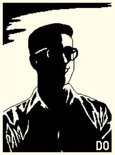
All text was hand-entered (no OCR scans) by Dick Oakes who did the layout, markup and graphics reproduction (all of Harry's misspellings retained). The contents remain the property of Bill Lincoln and his heirs.

